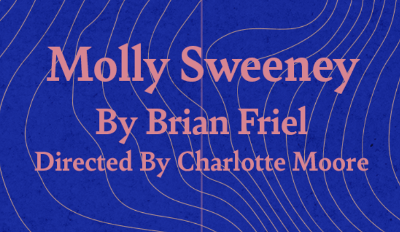SWEENEY NOD
By any measure, Irish playwright Brian Friel (who died in 2015) is one of the 20th-century’s great dramatists, whose works are among the lasting treasures of Irish literature. Irish Repertory Theatre is concluding its season of The Friel Project, a retrospective of Friel’s work starting with Translations, Aristocrats and Philadelphia, Here I Come!, and what company would be better suited for such an endeavor? Irish Rep is rightfully considered specialists in Friel, and Friel himself expressed his enthusiastic support for their work. However, the current production of Molly Sweeney — which opened Thursday — suffers, I think, from an excess of solemn respect.
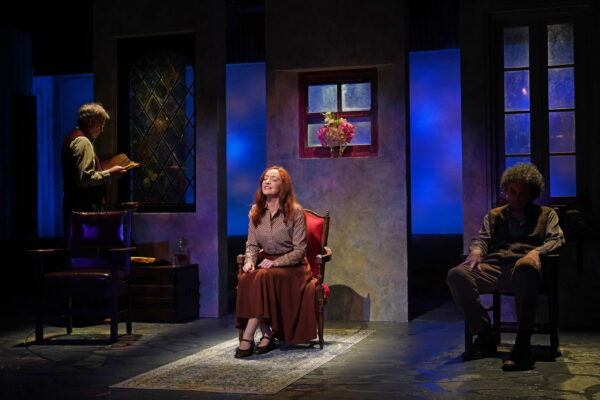 Rufus Collins, Sarah Street, and John Keating
Rufus Collins, Sarah Street, and John KeatingMolly Sweeney, a woman who was born blind, but who is also satisfied by her lot having been raised by a loving father who taught her to appreciate life despite her lack of sight. She is a contended adult with a full life, but her husband, a passionate man with a taste for projects, gets it in his head that she might be cured, and insists on consulting a famous eye surgeon to see if Molly’s sight can be restored. The operation is successful, but the effect on Molly is not as expected. She is overwhelmed by the experience and feels lost in her new, sighted world, gradually withdrawing from an active life. The play is an opportunity to reflect on the meaning of sight and understanding, vision and wisdom, and includes passionate discussions of such matters from both philosophical and practical perspectives.
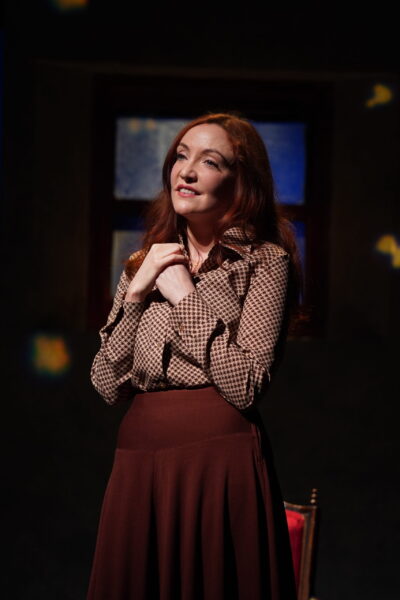 Sarah Street
Sarah Street Molly’s story is told in two acts (before and after her operation) by three actors delivering monologues directly to the audience: Molly, her husband, and her eye doctor. They comment on the complications of Molly’s sight from varying perspectives. Friel’s material is fascinating, and the monologues are rich, insightful, and full of wondrous and sonorous language, rich in import.
Perhaps too rich, in the case of this production. The actors seem to have chosen soaring rhetoric and beautiful sonority over characterization and drama. They speak the monologues with great beauty and in measured tones, each syllable ringing out like a bell. Every vowel and every consonant is perfectly articulated, but the inner life and passions which the words describe seem to have been given short shrift.
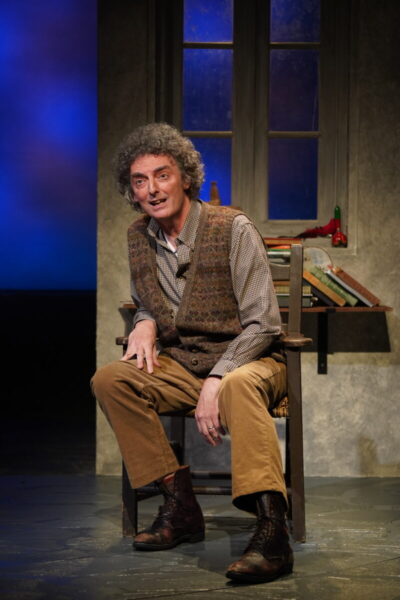 John Keating
John KeatingAs Molly, Sarah Street certainly has some glorious moments, but for the most part she seems uninvolved. For much of the play, Molly seems bored and withdrawn, and, alas, so does the actress. The monologues are delivered with clarity and excellent diction, but that seems to be their entire focus. The actress eveals to us nothing of an inner life.
The same is true of Rufus Collins as Mr. Rice the famous surgeon. We know from his monologues that he has everything at stake in Molly’s operation. His career has been in the doldrums and he is hoping to achieve a medical miracle that will restore his reputation. We get the picture, but he doesn’t seem to care very much.
John Keating, playing Molly’s husband Frank Sweeney, is somewhat more exciting. His character’s enthusiastic and eccentric intellect lends it self to a more exciting presentation and that is what he delivers, although bordering somewhat on caricature.
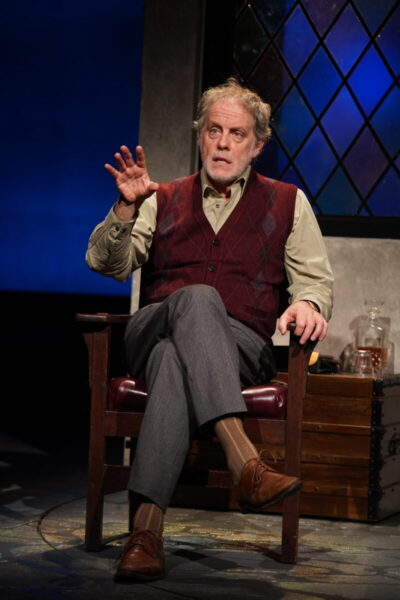 Rufus Collins
Rufus CollinsMy overall impression is that this production, as directed by Charlotte Moore, focused more on making sure that the plot was clear and the language beautifully and respectfully delivered, than on the inner life of the characters. When Molly tells of a time before her operation when she got drunk at a party and wildly danced, blind, through several rooms with perfect confidence, I thought to myself that this woman doesn’t appear to have had a wild moment in her entire life. She had the words of the story, but there was no music.
I was not alone in my indifference. After the intermission the entire row of seats next to me, full during the first act, was abandoned, except for one lady in the next seat, and she was fast asleep. At least until her phone rang for what seemed like a full minute in the middle of the second act. The actors seemed as little perturbed by this interruption as they were by any subtext to their monologues.
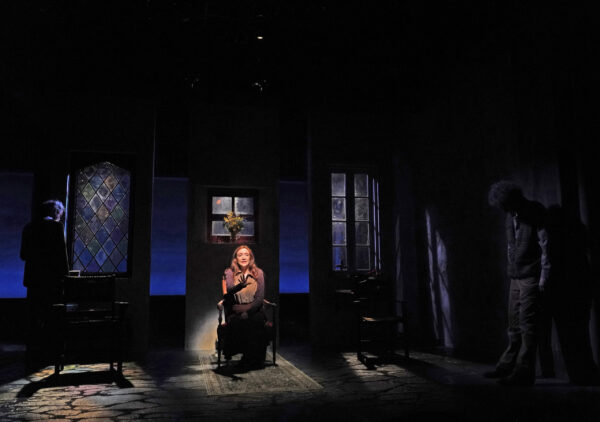 Rufus Collins, Sarah Street, and John Keating
Rufus Collins, Sarah Street, and John KeatingThe minimal scenic design by Charlie Corcoran was adequate as were Linda Fisher‘s costumes. Michael Gottlieb‘s lighting design changed in ways that seemed to suggest an emotional richness that was not apparent in the acting, and Hidenori Nakajo‘s sound design occasionally underlined some passages without making much difference to their effect.
It is difficult to imagine how the Irish Repertory Theatre could have managed such an extraordinary misfire for this extraordinary play and one can only hope it is a one off as the rest of their Brian Friel Project was most successful. Not recommended, alas.
photos by Carol Rosegg
Molly Sweeney
Irish Repertory Theatre, 132 West 22nd St
Francis J Greenburger Mainstage
ends on June 30, 2024
for tickets, call 212.727.2737 or visit Irish Rep
